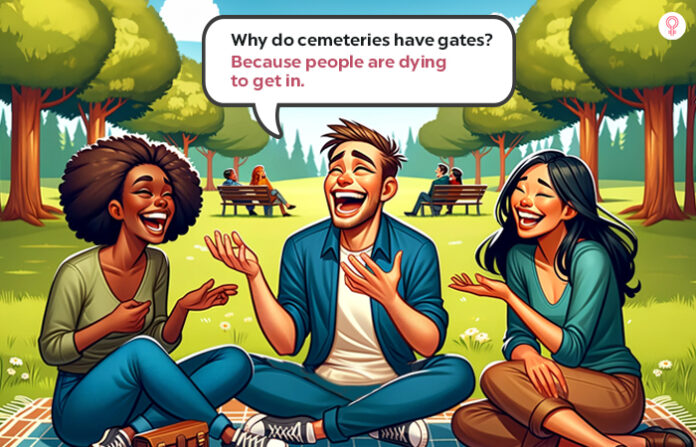Political jokes have long been a staple of humor, offering both entertainment and insight into the complexities of politics. In this article, we’ll delve into the role of political jokes, their power to shape public opinion, and the controversies they often ignite.
The Power of Satire in Politics
Satire serves as a powerful tool for political commentary, using humor to highlight absurdities and injustices in society. Shows like “Saturday Night Live” and “The Daily Show” have become renowned for their satirical take on current events, influencing public discourse and challenging authority.
Historical Examples of Political Humor

From ancient political cartoons to modern stand-up comedy, political humor has a rich history dating back centuries. Satirical publications like “Punch” and “Mad Magazine” have lampooned politicians and social norms, providing a platform for dissent and critique.
Throughout history, political humor has been used as a powerful tool to critique authority and engage with complex socio-political issues. One notable example dates back to ancient Greece, where playwright Aristophanes employed satire and comedy to lampoon prominent figures and institutions in his theatrical productions. In the Roman Empire, political satire thrived in the form of writings by authors such as Juvenal and Horace, who used humor to criticize corruption and inequities in Roman society.
During the Enlightenment era, political cartoons emerged as a popular medium for commentary and critique. Artists like James Gillray in England and Honoré Daumier in France used their illustrations to skewer politicians and monarchs, often with biting wit and caricature.
In the United States, the tradition of political humor has a rich history, with figures like Mark Twain and Will Rogers employing satire to comment on issues such as government corruption and social injustice. Twain’s humorous critiques of American society in works like “The Adventures of Huckleberry Finn” and his satirical essays continue to resonate today.
More recently, late-night television hosts like Jon Stewart and Stephen Colbert have gained prominence for their satirical take on current events and political figures. Their shows, “The Daily Show” and “The Colbert Report,” respectively, blended humor with incisive commentary to engage audiences and provoke thought about contemporary political issues.
These historical examples illustrate the enduring power of political humor to entertain, inform, and challenge prevailing ideologies, highlighting its role as a crucial aspect of democratic discourse.
The Influence of Political Jokes on Society

Political jokes can shape public opinion, influencing how individuals perceive political figures and policies. Comedians often serve as cultural commentators, offering unique perspectives on the issues of the day and challenging the status quo.
Controversy Surrounding Political Humor
Despite their comedic intent, political jokes can sometimes spark controversy and backlash. Comedians walk a fine line between humor and offense, grappling with the limits of free speech and the consequences of pushing boundaries.
Controversy surrounding political humor often stems from the fine line between satire and offense. While political humor has long been a tool for social commentary and critique, it can also spark heated debates and backlash. Some argue that political humor serves as a vital form of expression, providing a platform to challenge authority and hold leaders accountable through satire and mockery.
However, others contend that it can trivialize serious issues or perpetuate harmful stereotypes, leading to accusations of insensitivity or even promoting divisiveness. Additionally, political humor can become particularly contentious in polarized environments, where individuals may interpret jokes differently based on their own beliefs and affiliations. Despite these controversies, political humor continues to play a significant role in public discourse, shaping perceptions of politicians and influencing public opinion. As such, navigating the complexities of political humor requires a nuanced understanding of context, intent, and the potential impact on diverse audiences.
The Fine Line Between Comedy and Offense

Navigating sensitive topics requires skill and tact, as comedians strive to entertain without causing harm. Context plays a crucial role in determining the appropriateness of political humor, with comedians often using satire to shed light on pressing social issues.
Benefits of Political Jokes in Democracy
Despite the risks, political jokes play a vital role in democracy, encouraging critical thinking and holding those in power accountable. By challenging authority and poking fun at the establishment, comedians help to keep democracy vibrant and alive.
Conclusion
In conclusion, political jokes serve as a lens through which we view the world of politics, offering both entertainment and insight into the complexities of governance. While they may sometimes court controversy, their role in shaping public discourse cannot be understated.
FAQs
- Are political jokes protected by free speech?
Yes, political jokes are generally protected by the principle of free speech, although there may be legal limitations in certain contexts.
- Can political humor change public opinion?
Yes, political humor has the potential to change public opinion by influencing how individuals perceive political figures and policies.
- How do political comedians navigate sensitive topics?
Political comedians navigate sensitive topics with careful consideration for context and audience reaction, often using satire to highlight social issues.
- What are some famous examples of political satire?
Famous examples of political satire include shows like “Saturday Night Live,” “The Daily Show,” and publications like “The Onion” and “The New Yorker.”
- What role do political cartoons play in society?
Political cartoons serve as a visual form of political humor, offering commentary on current events and social issues in a concise and impactful manner.

